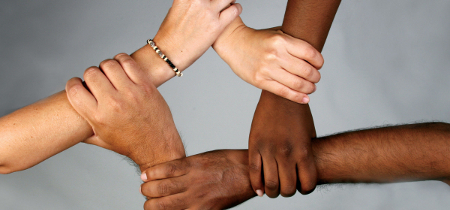Confession, Repentance, and Racism- Who Me?

The book of James instructs us: Therefore, confess your sins to one another and pray for one another, that you may be healed, (5:16).
Yes, we can confess our sin privately to God. But if we are not ALSO confessing our sins to one another, we are not obeying the Word of God. Our souls will be DISEASED and never heal without this.
What does this have to do with racism?
In the church, we know either through teaching or maybe just implicitly, that racism is not right; that it is unjust. After all, the US went through the Civil Rights Era, and we all celebrate Martin Luther King Jr. Day. But since we know that racism is sin, we have a tendency to HIDE that sin in the church. As Reimer writes, we think - "I can't [confess that]. I'm afraid." If we have said or done something racist, we don't want anyone to know about it, and we certainly don't want to admit it to ourselves. We don't want to BE racists. Shudder! But if the sin of racism doesn't get REPENTED of, it will get BURIED. The deaths of Ahmed Arbery, Breanna Taylor, and George Floyd have only uncovered again what was buried in our the minds of many in our country and churches. The sin of racism on an individual and systemic level is alive and real.
On an individual level, we experience freedom not when we hide or bury our sin but confess it to others. So the next time someone suggests that what you just said or did was racist, your first instinct should not be to say "Oh! I'm not a racist!!" or "I was just joking!" instead, try to listen sincerely and see it as an opportunity to be set free through repentance, to listen to what this person is saying and consider, "could I have bias? could I harbor any racist tendencies even though I don't WANT to be racist?" Repentance is not to make us feel condemned, it is to set us free.from our sin. Don't we all want to live in freedom? It only happens through repentance."
"A couple of years ago, I was arriving home from work and was having trouble raising my garage door with my clicker. I got out of the car, and I struggled to raise the garage door manually. As I was working on raising the door, a black man who looked dirty and sweaty and tired and smelled of gasoline approached me and tried to get my attention. I barely turned around, telling him that I didn't have time for him because I was obviously having trouble getting into my own house. However, he wouldn't leave, and his persistence was distracting me. I did everything I could to ignore or dismiss him, but as I worked on the door he politely continued to try to get me to turn around and talk to him. Finally, I turned around and asked him what he wanted.
He said, "Sir, you don't understand. I am your neighbor across the street. You left your garage door open this morning, and I noticed it. Your next-door neighbor and I got together and decided to manually shut the garage door for you so that your stuff would be safe, and I just wanted to let you know that's why your clicker didn't work today. We had to put it on manual mode."
I felt like a fool -- this black man was my neighbor. This black man mattered, and I treated him like he didn't matter at all. I'm still practicing awareness and kindness, hospitality and listening, but I know I have a long way to go...Folks, black lives matter. They matter they matter they matter they matter they matter. Where I have failed to show that they matter, Lord Jesus Christ, son of God, have mercy on me, a sinner, and help me to do and act in a way that reflects your love.
I'm preaching on the story of the good Samaritan tomorrow, as many of my fellow preachers are probably going to do. It is not the parable of the Good Person, because Jesus was teaching them that all Samaritans matter. Why was that necessary? I mean, Jesus loves everyone, so why not just stick a generic person in the story? It was necessary because at that time he needed to teach them that SAMARITANS mattered, too. It is equally important in our time to boldly teach in the white churches of America that Black Lives Matter, too, and that they are made in the image of a God who wants us to love them and serve them with the love of Jesus. Did we already sort of know that? Maybe. Have we "gone and done likewise?" I think that is where we have failed, and that is where we need to confess, repent, and begin the work of truly reflecting in our actions the love of Christ." -Victor Lyons, Pastor at Christview Christian Church in Memphis, Tennessee.


Comments